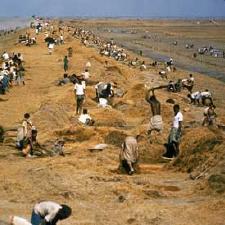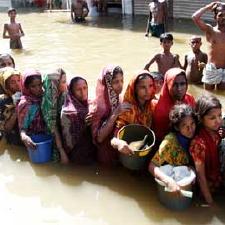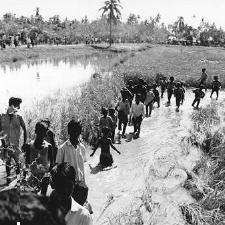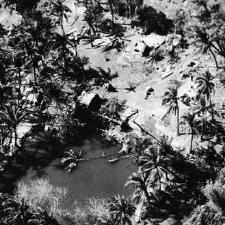Adil Najam
 It wiped out villages. Destroyed crops. Over 3.6 million people were directly affected. Nearly 85% of the area was destroyed. Three months after the catastrophe some 75% of the population was receiving food from relief workers (more here).
It wiped out villages. Destroyed crops. Over 3.6 million people were directly affected. Nearly 85% of the area was destroyed. Three months after the catastrophe some 75% of the population was receiving food from relief workers (more here).
It happened in Pakistan. Yet few Pakistanis even know of it by name. Fewer still remember that it eventually contributed to Pakistan’s break-up.
The 1970 Bhola cyclone hit then East Pakistan on November 12, 1970. It brought with it winds of an unbelievable 185 km/hr. It left in its wake a half million Pakistanis dead.
Meteorologists remember it as being one of the most deadly natural disasters in human history – sources suggest that it left between 300,000 to 1 million Pakistanis dead in its wake; most estimates suggest around 500,000 Pakistanis died.
Historians tend to agree that although there were many other forces at work, the devastation caused by the cyclone and the widespread view that the government had mis-managed the relief efforts and West Pakistan had generally shown an attitude of neglect, contributed to high levels of anti-West Pakistan feeling, a sweeping victory for the Awami League, and eventually the breakup of Pakistan and the creation of Bangladesh.
Such, then, are the forces of nature. And such are the forces of history.
As we hear newspaper headlines proclaiming the historic magnitude and devastation wrought by the floods on our plains, it is worth remembering that 40 years ago The New York Times was describing another calamity in Pakistan as the “Worst Catastrophe of the Century.” Much more importantly, we should pay close attention to the lessons of history, and the lessons of nature.
The lesson of how policy mismanagement led to public dissatisfaction and eventually contributed to national dismemberment is a stark reminder. It may not be an entirely applicable parallel since so much more had already happened and gone wrong in the East Pakistan case (and the cyclone was a contributor to, not the cause, of how history unfolded) but it is a lesson that should not be lost on the politicians, policy-makers and people of Pakistan.
The famous national song, “Ghar Tou Akhir Apna Hai” by Shahnaz Begum was, in fact, written in response to Bhola:
There is a reason why disasters require national solidarity. Without it, they can become even more disastrous and deeply buried fissures in the social fabric can burst forth in volcanic anger. As we look around at the political, policy and citizen response to the current floods, one sees too many who wish to turn disaster into a political opportunity. Those who do would be well advised to remember Bhola. Indeed, we would all be well advised to remember Bhola. (Some of these implications, including on the swell on anti-West Pakistan feelings in the 1970 elections, is discussed in my later article on the political implications of Cyclone Bhola, here).
I write these lines with some trepidation and with great caution. History is not a predictive science. And I do not believe that there is a real parallel between the two situations.
But I do believe that there are important lessons to learn from our own mistakes. For the sake of our present, if not of our past, let us resolve not to make the same mistakes again. Let us not forget what is the real lesson of Bhola in 1970, as of so many other tragedies: dissatisfaction in times of crisis can be a force of agony, and political catastrophe can sometimes grow from seeds sown in natural disaster.
























































Adil Najam
You have touched a very sore point in Paky consciousness. It is time indeed to rethink the very basis of our nationality. The flood in erstwhile East Pakistan enabled Mujib’s Awami League to represent the will of the people of East Pakistan (and so of Pakistan) but the minority constituting four provinces of the West Pakistan opposed their demand of ‘Six Points’. What happened is a history.
In Pakistan today it is the demand of the will of the people of Punjab representing the majority of the Paky nation to build Kala Bagh dam which is being opposed by the three provinces representing only the minority of the Paky nation who are unaniimous only on one point that the KBD is beneficial to Punjab. But they are not prepared to think how much loss has occurred to Pakistan as a whole by floods which could have been averted and put to better use by building dams.
The problem is the will of the people has not yet found a dedicated leader like Mujib to fight for their demand which is in fact a matter of life and death for Punjab and for the whole of Pakistan for that matter.
Isn’t there a (Chinese?) saying that ‘there is an opportunity in every crisis’? As @WatanAziz says, this crisis–indeed of historic proportion (perhaps no other modern natural disaster has affected so many people?)–gives opportunity to rebuild in a better way.
I had my doubts about Kalabagh Dam. I still do. I had my doubts about India’s role in the management of Kashmir’s water flowing into Pakistan. I still do. But I also think that Pakistan can make a better use of the water she already gets every year before looking at Indian role.
Will our ‘suo motto’ Judiciary take some initiative about this? Will our armed forces, who have directly ruled Pakistan for half its history–and have done precious little about water management– put something into the ears of the ‘corrupt’ politicians? Will our blogspace move away from Zardari’s ‘shoe’ incident to talk about the water management problems? I know, there is an almost reflexive criticism of ‘democracy’ and ‘politicians’ but their footprint on the Pakistani political-soil are not as strong as the jackboots of the Khakis.
i hope we learn from history but i do not believe it will happen.
We are govern by bunch of thug , currupt dishoneSt people.
All leaders have bank account , palAces abroad and sutuation get worse they will bail out and live there. They are asking world FOR HELP and what about they stole from pakistan. Why they do not bring back and give to Pakistan.
May ALLAH help up AMEEN
Thank you for highlighting this. It is a sobering story and one that we have forgotten. I think those who are fostering hate for govt in light of this tragedy should take note that we can keep our opposition for Mr. Zardari different from our support for the Pakistan govt in its efforts to provide relief. Those are two different things.
P.S… Yes, lets just ignore the hate mongers, they cannot be argued with.
God is really merciful that is why She (or is it a He) blesses mankind with all this destruction in which mostly the poor people or small children are killed ruthlessly.
Wait a minute, that dint make sense. Let me stop thinking logically, as that is my only way out of this.